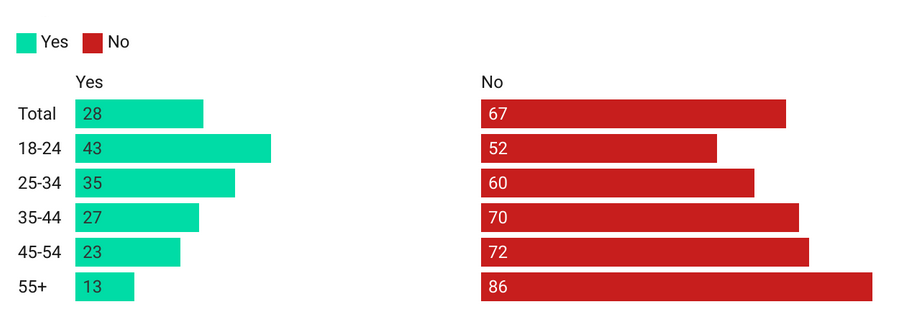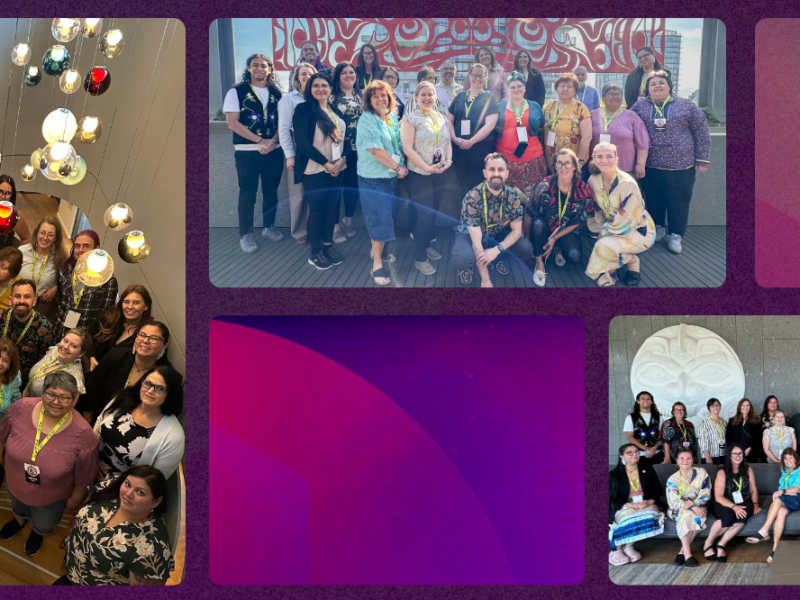Using AI Programs at Work: How Canadians are Reacting to Technological Change in the Workplace

Artificial intelligence (AI) technologies are attracting attention for their potential to bring significant changes to the workplace, some of them positive (more productivity and creativity) and some negative (more automation and unemployment). Here’s a summary of some recent survey findings about how workers in Canada are reacting.
First, across the population as a whole, about one in two Canadians (49%) say they’re at least somewhat familiar with AI programs that people can use in the workplace. The survey question specified: “Some examples of these AI programs are chatbots like ChatGPT or Bing Chat, image generators like Midjourney or Sora, content creation tools like Jasper or Copy-ai, or coding assistants like Copilot.” Those in the labour force (55%) or who are employed full-time (58%) are a little more likely than average to say they’re familiar with AI.
Not surprisingly, there’s a big difference across age groups, with younger Canadians being much more likely to say they’re familiar with AI programs that people can use in the workplace.
Familiarity with AI programs
How familiar would you say you are with artificial intelligence programs that people can use in the workplace?

Created with Datawrapper
The proportion that uses such programs is lower than the proportion expressing some familiarity with them: 28 percent of employed Canadians say they’ve used an artificial intelligence program to help with tasks at work. But once again, that proportion is much higher among younger workers.
Use of AI programs at work
Have you ever used any of these artificial intelligence programs for any of the following? To help with tasks at work
Subsample: Employed

Created with Datawrapper
There are several other findings of particular interest. The first is that most people who are using AI at work are doing so without much help from their employers. Of those who use AI at work:
- Only 29 percent say they’ve had any training on the topic from their employer. Slightly fewer (24%) obtained some training, but not from their employer. The greatest share (44%) didn’t get any training on how to use AI programs at work.
- Only 25 percent say their employer has written guidelines about using AI programs at work. A larger share (34%) says their employer has talked to them about using AI programs at work (but not provided them with written guidelines), and 35 percent say they’re figuring out how to use AI at work on their own.
A second interesting finding is that the experiences that workers have with AI seem overwhelmingly positive. Large majorities say that the use of AI programs at work has made them more productive and more creative. In each case, only a handful say it’s made them less so.
Impact of AI on productivity and creativity at work
Please think about the impact that using an artificial intelligence program has had on the way you do your job. Would you say that it has made you more or less productive / creative?

Created with Datawrapper
This doesn’t mean that there are no concerns about the impact of new technologies like AI on employment. In fact, a third finding of interest is that 36 percent of employed Canadians currently agree that “I worry that I might lose my job in the coming years because the work I do will soon be automated (in other words, it will soon be done by computers or robots).” And concern about this outcome is much higher among those who have used AI at work (51%) compared to those who have not (30%).
This may just reflect a greater familiarity with AI technologies and their potential for disruption generally, more than an immediate concern about personal job security. But it’s also notable that the overall proportion worried about losing their jobs due to automation was a bit higher in the 2024 survey than when the question was first asked a year earlier. We’ll be watching to see whether that number will continue to climb.
The data in this post are from the Survey on Employment and Skills. This survey is conducted by the Environics Institute for Survey Research, in partnership with the Diversity Institute at Toronto Metropolitan University and the Future Skills Centre. The seventh wave of the study consists of a survey of 5,855 Canadians aged 18 and over, conducted between May 30 and July 4, 2024, in all provinces and territories. It was conducted both online (in the provinces) and by telephone (in the territories). The author is solely responsible for any errors of presentation or interpretation.
This blog was originally published at Canadian Survey Stuff substack.
The views, thoughts and opinions expressed here are the author’s own and do not necessarily reflect the viewpoint, official policy or position of the Future Skills Centre or any of its staff members or consortium partners.




